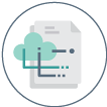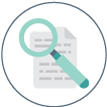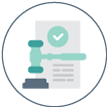In today’s data-driven world, information represents the company’s lifeblood. But, like any valuable asset, data requires careful management and protection. Enter the data steward. But who are data stewards and why are they important for your business? Understanding the role of the data steward and how it pertains to data governance is key.
In essence, the data steward acts as the guardian of data assets, ensuring their accuracy, consistency, accessibility, and usability. Data stewards generally work in IT but collaborate closely with departments across the organization. Thus, they act as a bridge between the technical and business sides, requiring a unique skillset.
Data Stewardship Puts Data Governance into Practice
Data stewardship plays a pivotal role in effective data governance, translating policies into practice. A data governance framework includes the policies and guidelines for data handling, quality, and security. Data stewards have responsibility for ensuring the implementation and enforcement of these policies.
For example, to enforce data quality standards and ensure trustworthy data for decision making, a data steward might conduct regular data audits to identify inaccuracies or inconsistencies. They could then implement data cleansing processes to eliminate duplicate entries, correct errors, and update outdated information.
Or, to ensure that data access falls within regulatory compliance restrictions, the data steward might design and oversee role-based user access controls. This helps the company achieve a fine balance between data democratization and critical data security.

In implementing data governance policies, the data steward collaborates closely with other data governance roles. For instance, data stewards work closely with data custodians, who provide technical support and maintenance related to data. They also work in tandem with data owners in various departments, as well as the data scientists who retrieve and analyze data.
Responsibilities of a Data Steward
Data stewards oversee all activities related to data management. This multi-faceted role includes several main categories of responsibility:
- Data quality assurance – This involves monitoring data for errors or inconsistencies, as well as implementing processes to maintain data accuracy.
- Data security and compliance – Data stewards ensure the protection of data from unauthorized access. They implement security measures, make sure data usage complies with legal and regulatory requirements, and raise awareness about data security best practices.
- Data accessibility and usability – Stewards balance strict data security standards with making sure that authorized users can find and use data. This involves building a data inventory, maintaining data lineage, managing metadata, and so forth.
- Data advocacy – Data stewards promote data value by educating stakeholders on data quality principles, encouraging responsible data usage, and promoting strategic uses of data, such as data-driven decision making.
Businesses May Have Multiple Data Stewards
This responsibility list looks daunting and often proves more than one data steward can reasonably accomplish. Consequently, a company may assign multiple stewards to handle various aspects of data stewardship.
For example, the organization may assign separate data stewards to work with specific types of data, such as customer data. They may also assign stewards according to business function, such as sales or R&D. Alternatively, a data steward may have responsibility for one or more IT systems, such as email.

Skills to Look for in a Data Steward
Because data stewards cover both technical and culture-focused activities, they need a balance of various types of skills. Without a doubt, the job requires technical skills, including data modeling, databases, and database management systems. And in fact, data stewards often report up through IT.
But data stewards also need interpersonal skills and business acumen. Because they act as a liaison between IT and business functions, in addition to promoting good data practices throughout the company, they must be able to communicate and collaborate effectively. Additionally, they often act as subject matter experts in their area of responsibility.
Who are Data Stewards and Why are They Important for Your Business? Explore Key Benefits
Data stewards play a central role in implementing data governance and ensuring a healthy data ecosystem. They not only protect and manage data, but they also help the company navigate a complex data landscape and leverage data for strategic advantage. And as data plays an increasingly vital part in decision making and innovation, this role has become mission critical.
To set the stage for success, hire the right people and give them the tools they need to thrive. eGovernance solutions for information governance offer powerful, cloud-based solutions to help organizations use their information effectively and drive data value.
eGovernance Cloud Solutions
eGovernance is a Cloud based solution for preserving, discovering and accessing digital data within your email and document storage systems for compliance, audit, security, eDiscovery and warehousing of critical or older data.



